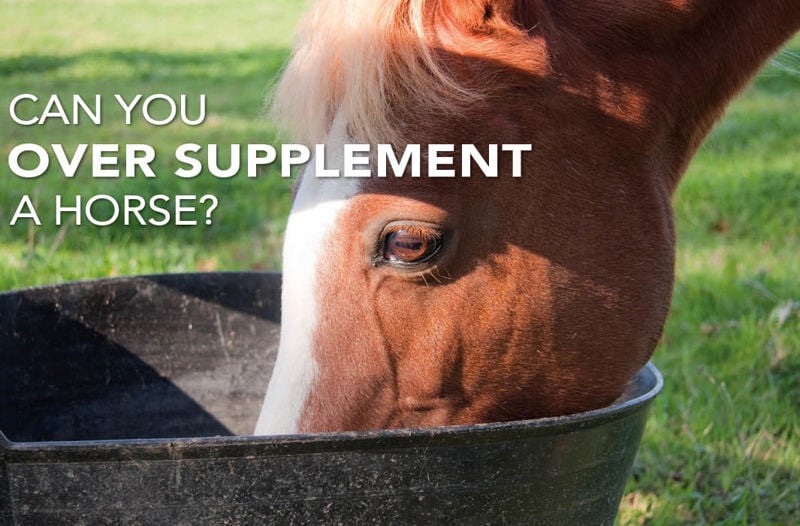Over the past decade, our understanding of horse nutrition has developed dramatically. With this progress has come a greater appreciation for how important it is to support the horse’s natural body functions to help maintain long-term health and well-being. As part of that, the equine supplements industry has grown rapidly - and it’s now quite common for horses to receive several supplements at once. But in meaning to do the very best for our horses, can we accidentally over-supplement?
When it comes to supplements, can there be too much of a good thing?
In short, yes. Feeding too much of a supplement, too many, certain combinations or some supplements in conjunction with medications, can all be detrimental.
Feeding too much of a supplement
Most of the time, feeding too much of a supplement, such as Best Flex HA, will simply not result in any extra benefit and so will be a waste of money. With a supplement that already contains high levels of the active ingredients, the horse can’t ‘use’ anymore, and so the excess will simply be excreted. This is also true, to a certain extent, for the water-soluble vitamins such as the B family. However, feeding certain vitamins and particularly minerals and certain herbs at higher levels than directed could result in toxicity. Bear in mind, too, that the horse will also obtain vitamins and minerals from their forage and feed, so more isn’t always better when it comes to vitamin and mineral supplements or balancers.
Too many supplements
If the basic diet is well-balanced for their age, workload and lifestyle, and provides a wide range of vitamins and minerals along with plenty of fibre, there shouldn’t be any need for too many supplements on top of that. Supplements should always be fed in a targeted and strategic way to address a specific need, and introducing more doesn’t necessarily always result in improved outcomes. Feeding multiple products can also mean ingredients overlap, which increases the chance of your horse receiving too much of certain nutrients. This can lead to the same issues seen with over-supplementation.
Certain combinations of supplements
Even when not feeding too many supplements, feeding two or three similar products might result in several duplicated ingredients. Although balancers might not necessarily be classed as a supplement, feeding a balancer with a vitamin and mineral supplement would likely result in higher than recommended levels of ingredients.
Some key minerals to be aware of are:
-
Selenium
-
Zinc
-
Calcium
-
Copper
-
Iron
While these are all vital for overall health and wellbeing, oversupply, particularly in the long-term, can result in digestive upset, liver issues and wider toxicity. As these minerals (along with phosphorus) can affect each other’s absorption, it’s also important to make sure they’re being fed in the correct ratios. Overfeeding one, even if not to a level that would induce toxicity, can cause issues as it will result in under-absorption of another.
Supplements in conjunction with medications
Although there isn’t always a lot of research around the nutrient-medication interactions in horses, some research exists to suggest that Chastetree Berry (Agnus Castus) may reduce the effectiveness of medications for horses being treated for Cushing's disease. Similarly, some ingredients can have similar effects on the body and may not be ideal to feed in combination. Long-term use of Bute, for instance, can irritate the stomach lining, and feeding Devil’s Claw alongside it may increase this risk, particularly in horses prone to ulcers.
If your horse requires medication, we recommend speaking to the prescribing vet about any supplements your horse is currently being fed.
Are loading intakes necessary?
Some supplements recommend a “loading” period - a higher initial dose to encourage a quicker effect. However, it’s important to understand how much active ingredient the product provides, as supplements that already deliver an effective daily amount often don’t need a loading dose.
While short-term studies suggest that loading can sometimes bring faster results, there’s little evidence that these benefits continue once the dose is reduced to a maintenance level. What we do know, however, is that sudden changes to a horse’s diet can upset the digestive system. For this reason, at Feedmark, we always recommend introducing any new supplement gradually.
Conclusion
With all the information and opinions surrounding feeding supplements, it can be an extremely confusing and overwhelming world to delve into. The key concerns are toxicity, negative interactions with other supplements or medications, and, in today’s economic climate, wasting money.
Checking supplement labels and, where necessary, asking the company for extra details is always a good idea to ensure you’re not doubling up on anything that could be harmful. One way to feed multiple supplements without the risk of over-feeding is to combine them into a Bespoke All-in-One. When making a Bespoke All-in-One, we add the ingredients from each of the products you’ve chosen individually, so you can be confident that you won’t be over-feeding any nutrients.



